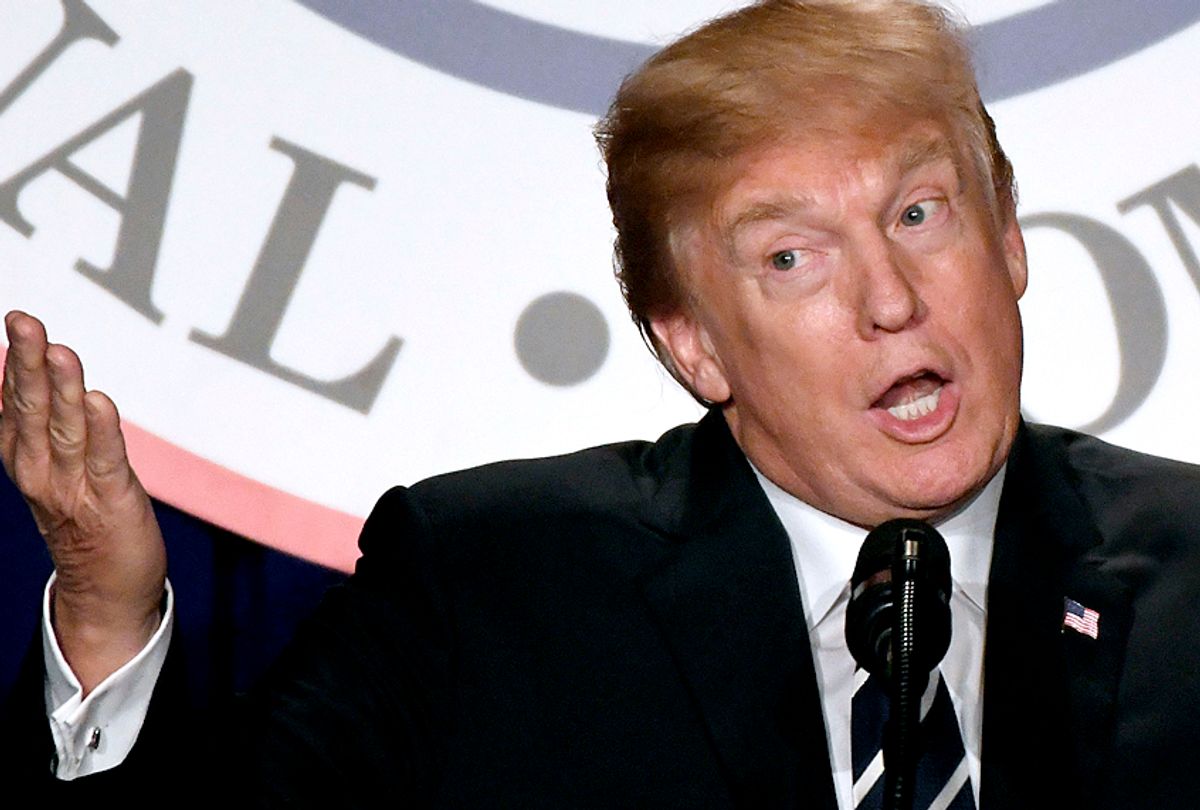During his vile State of the Union speech on Tuesday, Donald Trump made a very sinister and dangerous comment which has so far received little attention. Trump said, "I call on the Congress to empower every Cabinet secretary with the authority to reward good workers — and to remove federal employees who undermine the public trust or fail the American people.”
Translated: Donald Trump wants his Cabinet-level and other appointees to have the power to fire his political enemies and other dissenters without due process or substantive cause. Donald Trump is a petit-fascist and aspiring despot. His desire for total control and power requires that he subvert democratic norms and procedures. Unfortunately, the American people have already become numb to Trump's assault on democracy.
It is clear that Donald Trump represents a clear and present danger to the United States and the world. His erratic behavior, mood swings, compulsive lying, violence, and detachment from reality suggest that he may be mentally unwell. Trump's mental health challenges do not exist separate and apart from his fascist and other authoritarian impulses. In many ways, the former amplifies the latter.
Do mental health professionals have an obligation to warn the public about the threat embodied by Donald Trump? Despite Trump's obvious ethical, moral and political defects, why are tens of millions of Americans so attracted to him? How are mental health and other medical professionals who dare to tell the truth about Donald Trump being silenced? In what ways can Donald Trump's ascendance be understood as representing a deep cultural and social pathology in America?
In an effort to answer these questions I recently spoke with psychiatrist Bandy Lee. She is one of the principle editors of the New York Times bestselling book "The Dangerous Case of Donald Trump: 27 Psychiatrists and Mental Health Experts Assess a President."
On the threat posed by Donald Trump, she explains:
First, let me say, I speak for myself and not for my university. The book predicts danger and dangerousness. We have already seen this unfold. Basically, in "The Dangerous Case of Donald Trump" we were stating that past violence predicts future violence. Trump has shown verbal aggressiveness. He has boasted about sexual assault. He has invited violence at his rallies. He has shown an attraction to violence as a powerful weapon. He had not yet taunted a hostile nuclear power at that point. But in the book we actually predicted that devastating wars and even a nuclear holocaust were not impossibilities.
Now, it is even clearer that the danger we predicted about Donald Trump has happened on many levels. There has been an unprecedented spike in hate crimes since the day after his election. This trend has not yet abated. There has been an escalation in gun deaths since Trump's campaign. There are also reports documenting how a large proportion of extremist violence and domestic terrorism is coming from white supremacists.
The other dangers, of course, are his psychological instability. This includes Trump's impulsivity, recklessness, paranoid reactions, loose grip on reality, rage, lack of empathy, and the constant need to project and abuse power. His speech patterns have also changed. All these things have gotten worse over time. These all have profound ramifications for a person in his position of authority and power.
Lee also testified before Congress about Trump's mental health and the danger he embodies:
I met with about a dozen lawmakers, all Democrats except for one, and their response to my concerns about Donald Trump being a threat to the public was: “You don’t have to convince us. We’ve been very concerned about this. We are looking for ways to deal with it, but as the minority party, we don’t have any power. We know of Republican lawmakers who are just as concerned, probably equally concerned, but they are not expressing it. They’re not acting on it.”
Regarding Trump's supporters, Lee explained how:
Fascism has multiple dimensions. It is a psychological disorder where there is a psychological impairment of a leader and there is the impairment of the followers. There is also a general public that either remains complicit or inactive. They are silent. These ingredients need to be present for society to fall into a pathological state.
Pathology attracts pathology. A poor state of mental health to start with makes us vulnerable to being attracted to an impaired leader. The impaired leader is attractive and compelling to those who are already susceptible to such energy. From there one starts to spiral downward.
On this week's episode of "The Chauncey DeVega Show," I explain how Trump's State of the Union speech was a direct channeling of the white supremacist goal to end immigration from nonwhite countries. I also call attention to how Donald Trump and the Republican Party love to feature black and brown folks at their events in order to promote racist policies that actually hurt nonwhite people.

Shares